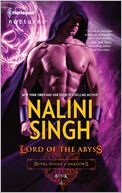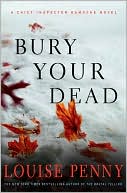 Lord of the Abyss by Nalini Singh is the much-anticipated conclusion to the Royal House of Shadows series. While I was glad to see the House of Elden restored, it seemed like the final battle was almost anti-climactic. On the other hand, the reverse “Beauty and the Beast” love story of Micah and Liliana was very well done.
Lord of the Abyss by Nalini Singh is the much-anticipated conclusion to the Royal House of Shadows series. While I was glad to see the House of Elden restored, it seemed like the final battle was almost anti-climactic. On the other hand, the reverse “Beauty and the Beast” love story of Micah and Liliana was very well done.
The daughter of the Blood Sorcerer practically sacrificed herself to transport her broken body through the barrier at the edge of the known realms. Why? Because the Lord of the Black Castle was the last of the children of Elden, and his presence was required in order to defeat her father. More than anything else, Liliana wanted to make sure that her father did not maintain his hold on Elden, even if his death also guaranteed her own.
But first she had to make Prince Micah remember who he truly was, and that was going to take something other than sorcery. Sorcery had cost him his memory, a combination of his mother’s dying spell that flung him to safety, and her father’s foul magic ensuring that he never recalled how he came to Black Castle.
The Lord of the Black Castle was the Guardian of the Abyss, the one who scoured the lands for the souls of those who are evil, whose souls must be cast into the Abyss. His body is encased in a carapace of armor, and he does not remember a time before he was the Guardian. But then, he was only five years old when he was the youngest Prince of Elden. He was just a child.
Now Micah is a man who does not even remember his own name. Liliana must make him remember himself and his own magic, and she only has a few weeks. She cannot use her own sorcery, or her father will find her. Even though she is ugly and broken, she is his possession, and he does not like it when his possessions escape.
So Liliana uses a different kind of magic. She appeals to the child within the man, cooking the treats he loved when he was a boy. And she tells him stories of Elden, stories that remind him of the time before. And she is kind to him, and she is not afraid. Her father beat her, tortured her, and murdered anyone or anything she cared for. Micah does not scare her.
But Micah reacts to her in ways she did not expect. She is the first woman he has ever met who is not afraid of him, and he is only a man. He does not care that she is not beautiful, he only knows that she is good to him, that she challenges him, and that she cares for him. He falls in love with her, not her looks.
And he remembers who he really is. Unfortunately, he also discovers who she really is. And that she concealed the facts from him. Deceit is the one thing that he is not sure he can forgive.
But as they race to the last battle, Micah learns that a love that is willing to sacrifice everything, even life itself, is the most important thing of all.
Escape Rating B: I think I would have liked this better if Micah and Liliana’s story had stood on it’s own. Their love story, her sacrifice to get to Black Castle, her temptation of Micah with childhood recipes and childhood stories, as well as their tentative exploration of love when neither of them had a clue, was heartwarming and touching, as well as deeply sensual.
All of the Royal House of Shadows books have been re-interpretations of fairy tales, and this one definitely re-worked “Beauty and the Beast” in some interesting ways. Both Micah and Liliana could be interpreted as Beauty and Beast, depending on which way you looked at things. Not just Liliana’s actual looks, but Micah’s armor and Guardian’s mannerism were also beast-like. They both change for the better. Black Castle even has invisible inhabitants!
But the re-telling of the Fall of Elden needed to end. I’m glad that’s over, and but it may have gone on one book too long. I’m glad the Blood Sorcerer is gone, too. Did he even have a name? Maybe it’s fitting that he didn’t.



